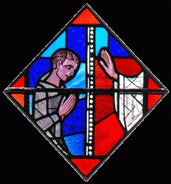
The Sacrament of Reconciliation and Penance (Confession)
When baptised children have reached the age of the use of reason they are to be presented for the Sacrament of Reconciliation and Penance (Confession).
In the Archdiocese of Glasgow, children, at present, receive this sacrament at Primary 3 stage, around 7 years of age, some time before Easter - usually during Lent.
St Paul's Catholic Primary school provide the immediate preparation for the Sacrament of Reconciliation and Penance (Confession) for all children living in the territory of our parish.
Probably, it was as a child you received this sacrament for the first time; at that time it may have been referred to, simply, as Confession, Penance, the Sacrament of Penance, Penance and Reconciliation or Reconciliation. (At present, our children usually call the sacrament the Sacrament of Reconciliation.) All of these names are `1relevant because they go to the heart of the sacrament:
sorrow for sin and a desire to be reconciled with God and the Church.
When Jesus, who is God, walked this earth he encountered people in all kinds of situations, sometimes situations that were socially and religiously beyond the pale. He, however, had a message of forgiveness and the desire to release people from what weighed them down. When people admitted their guilt, and sorrow was expressed, Jesus forgave sin, encouraging the person to convert and to sin no more.
In the Sacrament of Reconciliation (Confession) the Church continues this healing ministry of Jesus. The Sacraments are ever-powerful signs of the presence and ministry of Jesus in the Church. Through the celebration of this Sacrament, when we are open and sorry, we are assured that God forgives us, and that we enter more deeply into God’s life, as we travel on our own personal journey of conversion, with all its ups and downs. Sin not only harms our relationship with God but also with our neighbour – the Church.
The celebration of the Sacrament Reconciliation is an encounter with the forgiving Christ. When we celebrate this sacrament we are meeting Jesus who forgives. We can be frank and honest with God and ourselves for our own benefit as believing people and to the benefit of the whole community.
When baptised children have reached the age of the use of reason they are to be presented for the Sacrament of Reconciliation and Penance (Confession).
In the Archdiocese of Glasgow, children, at present, receive this sacrament at Primary 3 stage, around 7 years of age, some time before Easter - usually during Lent.
St Paul's Catholic Primary school provide the immediate preparation for the Sacrament of Reconciliation and Penance (Confession) for all children living in the territory of our parish.
Probably, it was as a child you received this sacrament for the first time; at that time it may have been referred to, simply, as Confession, Penance, the Sacrament of Penance, Penance and Reconciliation or Reconciliation. (At present, our children usually call the sacrament the Sacrament of Reconciliation.) All of these names are `1relevant because they go to the heart of the sacrament:
sorrow for sin and a desire to be reconciled with God and the Church.
When Jesus, who is God, walked this earth he encountered people in all kinds of situations, sometimes situations that were socially and religiously beyond the pale. He, however, had a message of forgiveness and the desire to release people from what weighed them down. When people admitted their guilt, and sorrow was expressed, Jesus forgave sin, encouraging the person to convert and to sin no more.
In the Sacrament of Reconciliation (Confession) the Church continues this healing ministry of Jesus. The Sacraments are ever-powerful signs of the presence and ministry of Jesus in the Church. Through the celebration of this Sacrament, when we are open and sorry, we are assured that God forgives us, and that we enter more deeply into God’s life, as we travel on our own personal journey of conversion, with all its ups and downs. Sin not only harms our relationship with God but also with our neighbour – the Church.
The celebration of the Sacrament Reconciliation is an encounter with the forgiving Christ. When we celebrate this sacrament we are meeting Jesus who forgives. We can be frank and honest with God and ourselves for our own benefit as believing people and to the benefit of the whole community.
